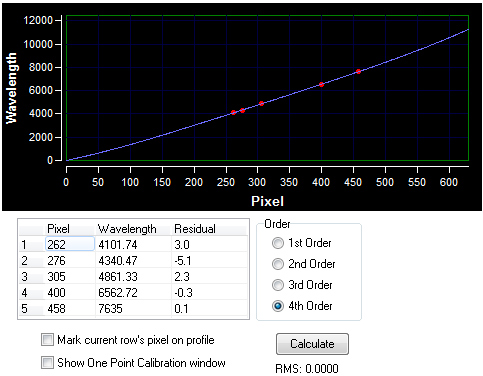<<PREVIOUS -
HOME -
CONTENTS -
NEXT>>
NSI 2011 INDEX -
![]()
Vega Spectrum Angstroms Calibration Without Zero Order by RSpec
|

|
The above image is the star Vega (Wikipedia). The round spectral order zero is on the left side of the image and its first order blazed grating spectrum is on the right side.
This web page shows how Field Tested Software RSpec V1.3.0 (Build: 39) non-linear Calibration Wizard was used to calibrate the horziontal axis in angstroms (Å) and shows the results of not including the zero order using the four different curves (1st, 2nd, 3rd and 4th).
Below each spectrum is the Calibration Wizard window with the five residuals that are in angstroms and the RMS for that order. Residuals equal to zero are ideal and RMS equals to zero is ideal.
Below is a summary table of the residuals and RMS value calculated in Excel VegaA06-012s06cropRMS.xlsx for both with and without the zero order. This web page shows the details of the calibration without the 0 order. This is the table on the right. Click on the table on the left to see the details of the calibration with the 0 order.

|

|
To put the values of the residuals in perspective the difference between CCD camera pixels at Hα is approximately 17.9 Å when using fourth order calibration without the zero order.
- The first order calibration which is linear has the Hα, Hβ and Hγ looking good on the spectrum chart. Hδ, Hε and Hζ absorption lines are at the wrong wavelength. Using RMS the first order calibration falls between the second to third order calibration using the zero order.
- The grating spectrum is non-linear and the focal plane is curved.
- Resolution Calculation for a Slitless Spectrograph By Dr. Doug West
- The second order calibration improves the Hδ, Hε, Hζ, Hα and A(O2) absorption lines. Hβ and Hγ absorption lines are worse than first order.
- The third order calibration improves Hβ, Hα and A(O2) absorption lines. But, Hγ and Hδ are worse than second order calibration.
- The forth order calibration has slight improvements over the third order calibration. There is very little difference between third order and forth order calibration looking at the spectrum chart. The forth order has the lowest RMS values with 0.00 (RSpec) and 2.84 (Excel).
- The spectrum chart vertical axis is the intensity values of the spectrum image.
- The red + are measured data points.
- The spectrum chart horizontal axis is wavelength in angstroms (Å).
- Reference yellow line markers show hydrogen Balmer absorption lines (Hα, Hβ, Hγ, Hδ, Hε and Hζ),
Fraunhofer
telluric
O2
absorption bands and
telluric H2O absorption band.
- Fraunhofer telluric a (O2) band is 6276 Å to 6310 Å (SPECTRAL CALIBRATION Identification of tellurics lines, by Christian Buil)
- Fraunhofer telluric B (O2) band is 6867 Å to 6944 Å (Table 95, page 100, Spectroscopic Atlas for Amateur Astronomers, Verson 2.0 by Richard Walker)
- Fraunhofer telluric A (O2) band is 7594 Å to 7684 Å (Table 95, page 100, Spectroscopic Atlas for Amateur Astronomers, Verson 2.0 by Richard Walker)
- Fraunhofer telluric Z (O2) line is 8227 Å
- Fraunhofer telluric y (O2) line is 8988 Å
- Telluric H2O band is 7168 Å to 7394 Å (Table 95, page 100, Spectroscopic Atlas for Amateur Astronomers, Verson 2.0 by Richard Walker)
- Below the spectrum chart is a synthesize color spectrum generated from the spectrum chart data.
- Data files in VegaA06-012s06crop4orderNo0.zip
- Spectrum image VegaA06-012s06crop.fit
- RSpec V1.3.0 (Build: 39) VegaA06-012s06crop4orderData.dat and VegaA06-012s06crop4orderData.ini
- RSpec V1.3.0 (Build: 39) VegaA06-012s06cropCal5pointsE.ini
RSpec Non-Linear 1st Order Calibration
- The first order calibration which is linear has the Hα, Hβ and Hγ looking good on the spectrum chart. Hδ, Hε and Hζ absorption lines are at the wrong wavelength.


|
RSpec Non-Linear 2nd Order Calibration
- The second order calibration improves the Hδ, Hε, Hζ, Hα and A(O2) absorption lines. Hβ and Hγ absorption lines are worse than first order.


|
RSpec Non-Linear 3rd Order Calibration
- The third order calibration improves Hβ, Hα and A(O2) absorption lines. But, Hγ and Hδ are worse than second order calibration.


|
RSpec Non-Linear 4th Order Calibration
- The forth order calibration has slight improvements over the third order calibration. There is very little difference between third order and forth order calibration looking at the spectrum chart. The forth order has the lowest RMS values with 0.00 (RSpec) and 2.84 (Excel).


|
Monitor Test Pattern
The following test pattern is to help you adjust your monitor to best view the CCD astro images. The test pattern is used for adjusting monitor brightness, and contrast. Adjust monitor brightness and contrast to see all 16 gray scale levels. The most important adjustment when viewing astro images is to see the differences in all of the black bands.